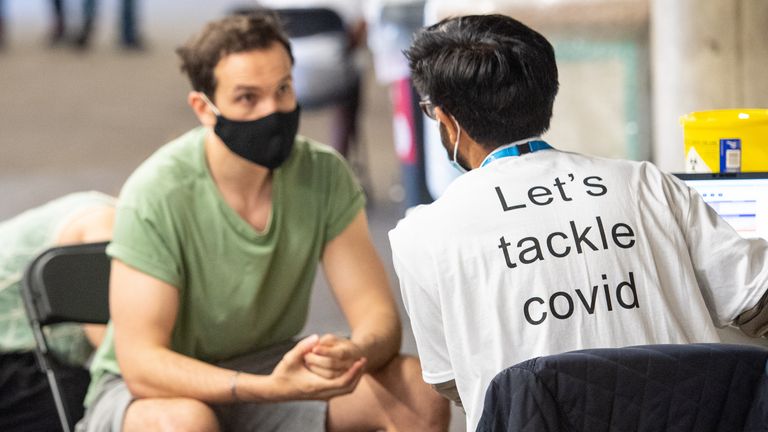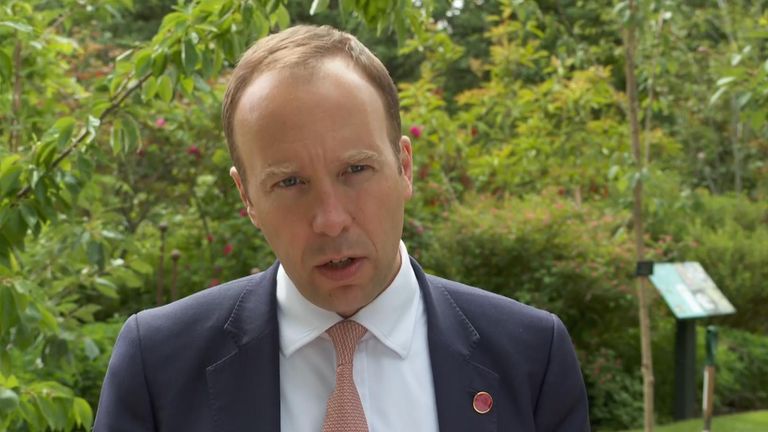COVID-19: Dating apps are going to offer perks for users who get a vaccine
The government has turned to dating apps to encourage young people to get vaccinated against COVID-19.
From Monday, Tinder, Hinge, Match, Badoo, Plenty of Fish, OurTime, Muzmatch and Bumble will allow users to show their support for the vaccine on their dating profiles.
They will also give in-app bonuses to those who say they have been vaccinated against the virus.
Users will see adverts and banners for the Every Vaccination Gives Us Hope campaign – and they will be able to use vaccination badges and stickers, free “super” likes and other features.
All of these new features are optional, but the Department of Health and Social Care insisted there was research showing that people are more likely to date someone who has had a COVID-19 jab.
There have long been fears that the high take-up seen among older people might not be reflected in younger people, who face lower risk of death or complications from the virus.
People under 30 will be invited to book their vaccination from this week but there are early signs that take-up may turn out to be better than expected.
According to figures from the Office for National Statistics, positive vaccine sentiment among those under 30 is lower than the national average, but it has increased markedly since the first COVID-19 vaccine was given in December.
Between 10 and 13 December last year, the figure for those aged 16 to 29 was put at 63% – but between 19 and 23 May it had shot up to 85%. The national rate for adults of all ages increased from 78% to 95% over the same time period.
Footage of various walk-in vaccination clinics around the country has shown that, when they have been allowed to get the jab, many young people have stepped forward.
A walk-in centre opened in Bolton – a hotspot for the more transmissible variant first reported in India – reported people as young as 17 getting vaccinated. And when a walk-in centre in Twickenham tweeted that anyone over 18 could get vaccinated, several hundred young people showed up hopeful of getting their jab.
There have also been reports since January of young people being able to get vaccinated as walk-ins at GP surgeries with doses that would otherwise be wasted due to storage limitations.
Young people face no shortage of reasons to get vaccinated as, in many ways, the effects of coronavirus lockdowns have hit them hardest.
ONS figures from March showed that those aged 16 to 24 made up 61% of those who had lost payrolled employment during the coronavirus crisis.
Many youngsters had their schooling or university education put on hold for months, and most will have heard experts warn that, although young people aren’t at high risk of complications from the disease, they are capable of spreading the virus to those who are.
Naomi Walkland, Bumble’s vice president for Europe, said one of the features on offer would see users able to state a preference for dating indoors or outdoors only.
She added: “The ‘COVID conversation’ is already front of mind for two in three people on Bumble, so it’s important to make it easier to feel comfortable and safe on a date.
Shahzad Younas, founder and chief executive at Muzmatch, said: “We understand the concerns young Muslims have regarding the vaccination, in particular those that are in the process of getting married.
“Misinformation has been spreading at an alarming rate in our communities, which is why we’re glad to work with the NHS to clear up myths about the vaccine and encourage our members to get vaccinated.
“As a marriage app helping single Muslims find love, we knew when the pandemic hit we had to act fast to ensure people could meet safely.”
Vaccines minister Nadhim Zahawi said: “This is another incredible asset to our vaccination programme – the biggest and most successful in our history.
“The vaccine is our way out of this pandemic and we have made incredible progress so far with over three-quarters of adults receiving at least one dose.
“I encourage everyone who is eligible to roll up their sleeves and get the jab – it could save your life and protect your loved ones.”
Source: Read Full Article




